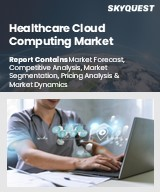
|
시장보고서
상품코드
1544724
헬스케어 클라우드 컴퓨팅 시장 - 기회, 성장 촉진요인, 산업 동향 분석과 예측(2024-2032년)Healthcare Cloud Computing Market, Opportunity, Growth Drivers, Industry Trend Analysis and Forecast, 2024-2032 |
||||||
헬스케어 클라우드 컴퓨팅 시장은 의료기관이 생성하는 방대한 데이터를 처리하기 위한 확장 가능한 IT 솔루션에 대한 수요로 2024년부터 2032년까지 16.1%의 연평균 복합 성장률(CAGR)을 나타낼 것으로 예측되고 있습니다.
클라우드 컴퓨팅은 스토리지, 데이터 관리 및 접근성에 큰 이점을 제공하여 방대한 환자 기록을 효율적으로 처리할 수 있습니다. 예를 들어, HIMSS의 2023년 설문조사는 헬스케어 조직의 80%가 데이터 관리에 클라우드 솔루션을 사용하고 있음을 확인했습니다. 클라우드 인프라스트럭처는 또한 전자 의료 기록(EHR)과 다른 시스템을 통합하여 상호 운용성을 높이고 전문가 간의 데이터 공유를 개선하여 환자 관리를 향상시킵니다.
헬스케어 조직은 온프레미스 인프라와 관련된 비용을 줄이고 IT 운영을 간소화하기 위해 클라우드 솔루션을 채택합니다. 클라우드 컴퓨팅을 통해 의료기관은 하드웨어 및 소프트웨어에 대한 엄청난 설비 투자를 피하고 대신 구독 기반의 고급 기술에 액세스할 수 있습니다. 이 시프트를 통해 의료 서비스 제공업체는 IT 시스템을 관리하는 것보다 품질 관리에 더 집중할 수 있습니다. 규제 요건과 환자 기대가 진화함에 따라 클라우드 솔루션의 유연성과 비용 효과는 비즈니스 및 환자 결과를 개선하려는 의료 기관에 더욱 매력적이 되고 있습니다.
서비스 분야는 헬스케어 업무의 지원과 강화를 제공하기 위해 2032년까지 견인력을 늘릴 것으로 보입니다. 클라우드 서비스 제공업체는 의료기관이 대량의 환자 데이터를 효율적으로 처리하고, 임상 및 업무 통찰을 위한 고급 분석을 수행하고, 원격 진단 및 환자 참여를 촉진할 수 있는 확장 성과 유연성이 뛰어난 솔루션을 제공합니다. 이러한 서비스를 활용함으로써 의료 서비스 제공업체는 업무 효율성을 향상시키고 환자 관리를 강화하며 진화하는 규제에 대응할 수 있습니다.
하이브리드 클라우드 분야는 프라이빗 클라우드 환경과 퍼블릭 클라우드 환경의 이점을 결합할 수 있기 때문에 2032년까지 주목할만한 시장 점유율을 차지할 것으로 보입니다. 이 모델에서 헬스케어 기업은 민감한 환자 데이터와 중요한 용도을 프라이빗 클라우드에서 관리하고 보안 강화 및 규제 요구 사항에 대한 컴플라이언스를 보장하지만, 민감하지 않은 데이터 및 용도에는 확장 가능한 리소스와 비용 효율적인 솔루션으로 퍼블릭 클라우드를 활용할 수 있습니다. 하이브리드 모델의 유연성은 온프레미스 시스템과 클라우드 기반 솔루션 간의 원활한 데이터 통합 및 상호 운용을 용이하게 하며, 의료 제공업체는 IT 인프라를 최적화하고, 데이터 관리를 강화하며, 변화하는 요구와 기술 진보에 의해 기민하게 대응할 수 있게 됩니다.
유럽의 헬스케어 클라우드 컴퓨팅 시장은 디지털 헬스 솔루션의 도입이 진행되고 데이터 보안과 규제 준수가 중시되게 된 것을 배경으로 2032년까지 큰 성장을 이룰 것으로 보입니다. 엄격한 데이터 보호 대책을 의무화하는 일반 데이터 보호 규칙(GDPR(EU 개인정보보호규정))과 같은 강력한 규제 프레임워크가 클라우드 기술에 대한 신뢰를 높이고 있습니다. 또한 클라우드 솔루션을 전자 의료기기(EHR)와 원격 의료 플랫폼과 통합함으로써 이 지역 전반에 걸쳐 데이터 상호 운용성과 환자 참여도를 향상시킬 수 있습니다. 유럽 전역의 헬스케어 기업은 IT 인프라의 근대화와 업무 효율성 향상을 목표로 하여, 이 지역 시장 역학을 형성하고 있습니다.
목차
제1장 조사 방법과 조사 범위
제2장 주요 요약
제3장 업계 인사이트
- 생태계 분석
- 업계에 미치는 영향요인
- 성장 촉진요인
- 헬스케어 전문가에 의한 클라우드 컴퓨팅 소프트웨어의 채용 확대
- 기술적으로 업그레이드된 헬스케어 클라우드 컴퓨팅 소프트웨어의 가용성에 대한 의식의 향상
- 유리한 규제 시나리오
- 데이터의 안전성과 무결성을 지원하는 정부 이니셔티브 증가
- 업계의 잠재적 위험 및 과제
- 클라우드 컴퓨팅 소프트웨어와 관련된 데이터 안전성 우려
- 성장 촉진요인
- 성장 가능성 분석
- 규제 상황
- 기술의 상황
- Porter's Five Forces 분석
- PESTEL 분석
제4장 경쟁 구도
- 소개
- 기업 매트릭스 분석
- 주요 시장 기업의 경쟁 분석
- 경쟁 포지셔닝 매트릭스
- 전략 대시보드
제5장 시장 추계·예측 : 컴포넌트별, 2021-2032년
- 주요 동향
- 소프트웨어
- 용도별
- 의료 제공자 솔루션
- 임상 정보 시스템
- 전자 의료 기록/전자 의료 기록
- 원격 의료 솔루션
- 외래 CIS
- 약국 정보 시스템
- 화상 보존 통신 시스템(PACS)
- 방사선 정보 시스템
- 검사 정보 관리 시스템
- 집단 건강 관리 솔루션
- 컴퓨터 의사 주문 진입 시스템(CPOE)
- 기타 임상 정보 시스템
- 비임상 정보 시스템
- 수익주기 관리 솔루션
- 공급망 관리 솔루션
- 청구·회계 관리 솔루션
- 재무 관리 솔루션
- 의료 정보 교환 솔루션
- 기타 비임상 정보 시스템
- 헬스케어 지불자 솔루션
- 고객 관계 관리 솔루션
- 청구 관리 솔루션
- 지불 관리 솔루션
- 공급자 네트워크 관리 솔루션
- 부정 관리 솔루션
- 의료 제공자 솔루션
- 서비스 모델별
- 서비스로서의 소프트웨어(SaaS)
- 서비스로서의 인프라(IaaS)
- 서비스로서의 플랫폼(PaaS)
- 용도별
- 서비스
제6장 시장 추계·예측 : 전개 모델별, 2021-2032년
- 주요 동향
- 퍼블릭 클라우드
- 프라이빗 클라우드
- 하이브리드 클라우드
제7장 시장 추계·예측 : 최종사용자별, 2021-2032년
- 주요 동향
- 의료 제공자
- 병원
- 약국
- 진단 및 이미지 센터
- 외래센터
- 헬스케어 지불자
- 공적 지불자
- 민간 지불자
제8장 시장 추계·예측 : 지역별, 2021-2032년
- 주요 동향
- 북미
- 미국
- 캐나다
- 유럽
- 독일
- 영국
- 프랑스
- 스페인
- 이탈리아
- 네덜란드
- 기타 유럽
- 아시아태평양
- 중국
- 일본
- 인도
- 호주
- 한국
- 기타 아시아태평양
- 라틴아메리카
- 브라질
- 멕시코
- 아르헨티나
- 기타 라틴아메리카
- 중동 및 아프리카
- 남아프리카
- 사우디아라비아
- 아랍에미리트(UAE)
- 기타 중동 및 아프리카
제9장 기업 프로파일
- Allscripts Healthcare Solutions Inc
- Amazon Web Services, Inc.
- AthenaHealth, Inc.
- CareCloud Corporation
- Cerner Corporation
- Cisco Systems, Inc
- ClearDATA
- Dell Technologies, Inc.
- GE HealthCare Technologies, Inc.
- Koninklijke Philips NV
- Microsoft Corporation
- Oracle Corporation
- PLEXIS Healthcare Systems
- Siemens Healthineers AG
- Veradigm LLC
The healthcare cloud computing market is anticipated to showcase a 16.1% CAGR during 2024-2032, due to the demand for scalable IT solutions to handle the vast data generated by healthcare entities. Cloud computing offers significant advantages in storage, data management, and accessibility, enabling efficient processing of extensive patient records. For instance, a 2023 study by HIMSS found that 80% of healthcare organizations use cloud solutions to manage data. Cloud infrastructure also integrates electronic health records (EHRs) and other systems, enhancing interoperability and improving patient care through better data sharing among professionals.
Healthcare organizations are adopting cloud solutions to cut expenses related to on-premises infrastructure and streamline IT operations. By using cloud computing, they avoid large capital expenditures on hardware and software, accessing advanced technologies on a subscription basis instead. This shift allows healthcare providers to focus on delivering quality care rather than managing IT systems. As regulatory demands and patient expectations evolve, the flexibility and cost-effectiveness of cloud solutions become increasingly attractive to healthcare organizations aiming to enhance operations and patient outcomes.
The overall healthcare cloud computing industry is classified based on component, deployment mode, end-user, and region.
The services segment is poised to gain traction through 2032, as they provide support and enhance healthcare operations. Cloud service providers offer scalable and flexible solutions that enable healthcare organizations to efficiently handle large volumes of patient data, conduct advanced analytics for clinical and operational insights, and facilitate remote consultations and patient engagement. By leveraging these services, healthcare providers can improve operational efficiency, enhance patient care, and comply with evolving regulations.
The hybrid cloud segment will hold a notable market share by 2032, due to its ability to combine the benefits of both private and public cloud environments. This model allows healthcare organizations to maintain sensitive patient data and critical applications on private clouds, ensuring enhanced security and compliance with regulatory requirements while leveraging public clouds for scalable resources and cost-effective solutions for less sensitive data and applications. The flexibility of the hybrid model facilitates seamless data integration and interoperability between on-premises systems and cloud-based solutions, enabling healthcare providers to optimize their IT infrastructure, enhance data management, and respond more agilely to changing needs and technological advancements.
Europe healthcare cloud computing market will experience significant growth through 2032, driven by the increasing adoption of digital health solutions and a rising emphasis on data security and regulatory compliance. The robust regulatory frameworks, such as the General Data Protection Regulation (GDPR), which mandates stringent data protection measures, foster trust in cloud technologies. Additionally, the integration of cloud solutions with electronic health records (EHRs) and telemedicine platforms is enabling better data interoperability and patient engagement across the region. Healthcare organizations across Europe seek to modernize their IT infrastructures and improve operational efficiencies, shaping the regional market dynamics.
Table of Contents
Chapter 1 Methodology and Scope
- 1.1 Market scope and definitions
- 1.2 Research design
- 1.2.1 Research approach
- 1.2.2 Data collection methods
- 1.3 Base estimates and calculations
- 1.3.1 Base year calculation
- 1.3.2 Key trends for market estimation
- 1.4 Forecast model
- 1.5 Primary research and validation
- 1.5.1 Primary sources
- 1.5.2 Data mining sources
Chapter 2 Executive Summary
- 2.1 Industry 360° synopsis
Chapter 3 Industry Insights
- 3.1 Industry ecosystem analysis
- 3.2 Industry impact forces
- 3.2.1 Growth drivers
- 3.2.1.1 Growing adoption of cloud computing software by healthcare professionals
- 3.2.1.2 Increasing awareness regarding availability of technologically upgraded healthcare cloud computing software
- 3.2.1.3 Favorable regulatory scenario
- 3.2.1.4 Rising government initiatives that support data safety and integrity
- 3.2.2 Industry pitfalls and challenges
- 3.2.2.1 Data safety concerns associated with the cloud computing software
- 3.2.1 Growth drivers
- 3.3 Growth potential analysis
- 3.4 Regulatory landscape
- 3.5 Technology landscape
- 3.6 Porter's analysis
- 3.7 PESTEL analysis
Chapter 4 Competitive Landscape, 2023
- 4.1 Introduction
- 4.2 Company matrix analysis
- 4.3 Competitive analysis of major market players
- 4.4 Competitive positioning matrix
- 4.5 Strategy dashboard
Chapter 5 Market Estimates and Forecast, By Component, 2021 - 2032 ($ Mn)
- 5.1 Key trends
- 5.2 Software
- 5.2.1 By application
- 5.2.1.1 Healthcare provider solutions
- 5.2.1.1.1 Clinical information systems
- 5.2.1.1.1.1 Electronic health records/electronic medical records
- 5.2.1.1.1.2 Telehealth solutions
- 5.2.1.1.1.3 Ambulatory or outpatient CIS
- 5.2.1.1.1.4 Pharmacy information systems
- 5.2.1.1.1.5 Picture archiving and communication system (PACS)
- 5.2.1.1.1.6 Radiology information systems
- 5.2.1.1.1.7 Laboratory information management system
- 5.2.1.1.1.8 Population health management solutions
- 5.2.1.1.1.9 Computerized physician order entry (CPOE)
- 5.2.1.1.1.10 Other clinical information systems
- 5.2.1.1.2 Non-clinical information systems
- 5.2.1.1.2.1 Revenue cycle management solutions
- 5.2.1.1.2.2 Supply chain management solutions
- 5.2.1.1.2.3 Billing and accounting management solutions
- 5.2.1.1.2.4 Financial management solutions
- 5.2.1.1.2.5 Health information exchange solutions
- 5.2.1.1.2.6 Other non-clinical information systems
- 5.2.1.2 Healthcare payer solutions
- 5.2.1.2.1 Customer relationship management solutions
- 5.2.1.2.2 Claims management solutions
- 5.2.1.2.3 Payment management solutions
- 5.2.1.2.4 Provider network management solutions
- 5.2.1.2.5 Fraud management solutions
- 5.2.1.1 Healthcare provider solutions
- 5.2.2 By service model
- 5.2.2.1 Software as a service (SaaS)
- 5.2.2.2 Infrastructure as a service (IaaS)
- 5.2.2.3 Platform as a service (PaaS)
- 5.2.1 By application
- 5.3 Services
Chapter 6 Market Estimates and Forecast, By Deployment Model, 2021 - 2032 ($ Mn)
- 6.1 Key trends
- 6.2 Public cloud
- 6.3 Private cloud
- 6.4 Hybrid cloud
Chapter 7 Market Estimates and Forecast, By End-user, 2021 - 2032 ($ Mn)
- 7.1 Key trends
- 7.2 Healthcare providers
- 7.2.1 Hospitals
- 7.2.2 Pharmacies
- 7.2.3 Diagnostic and imaging centers
- 7.2.4 Ambulatory centers
- 7.3 Healthcare payers
- 7.3.1 Public payers
- 7.3.2 Private payers
Chapter 8 Market Estimates and Forecast, By Region, 2021 - 2032 ($ Mn)
- 8.1 Key trends
- 8.2 North America
- 8.2.1 U.S.
- 8.2.2 Canada
- 8.3 Europe
- 8.3.1 Germany
- 8.3.2 UK
- 8.3.3 France
- 8.3.4 Spain
- 8.3.5 Italy
- 8.3.6 Netherlands
- 8.3.7 Rest of Europe
- 8.4 Asia Pacific
- 8.4.1 China
- 8.4.2 Japan
- 8.4.3 India
- 8.4.4 Australia
- 8.4.5 South Korea
- 8.4.6 Rest of Asia Pacific
- 8.5 Latin America
- 8.5.1 Brazil
- 8.5.2 Mexico
- 8.5.3 Argentina
- 8.5.4 Rest of Latin America
- 8.6 Middle East and Africa
- 8.6.1 South Africa
- 8.6.2 Saudi Arabia
- 8.6.3 UAE
- 8.6.4 Rest of Middle East and Africa
Chapter 9 Company Profiles
- 9.1 Allscripts Healthcare Solutions Inc
- 9.2 Amazon Web Services, Inc.
- 9.3 AthenaHealth, Inc.
- 9.4 CareCloud Corporation
- 9.5 Cerner Corporation
- 9.6 Cisco Systems, Inc
- 9.7 ClearDATA
- 9.8 Dell Technologies, Inc.
- 9.9 GE HealthCare Technologies, Inc.
- 9.10 Koninklijke Philips N.V.
- 9.11 Microsoft Corporation
- 9.12 Oracle Corporation
- 9.13 PLEXIS Healthcare Systems
- 9.14 Siemens Healthineers AG
- 9.15 Veradigm LLC



















